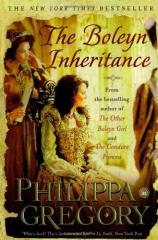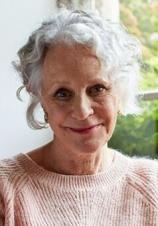The Boleyn Inheritance
Review
The Boleyn Inheritance
You know the old rhyme: "King Henry the Eighth, to six wives he was
wedded: One died, one survived, two divorced, two beheaded." The
story of the fickle Tudor monarch captured my imagination when I
was growing up --- I must have read dozens of fictional accounts of
the executions of Anne Boleyn (wife number two) and Katherine
Howard (wife number five), wondering what I would have done
in such a spot and probably, in the process, developing a rather
grisly and uncertain view of marriage.
Well, I still love ruffs and 16th-century madrigals, and Elizabeth
I, Henry's descendant, remains, in my opinion, the queen to end all
queens. And when I come upon a new Tudor novel, like THE BOLEYN
INHERITANCE, I still find myself rooting for the doomed wives
against Henry --- wanting them to escape their fate, identifying
with their terror, savoring the dreadful tension as they draw
closer to the end. But I didn't expect much in the way of surprises
from this book. After all, we know how it comes out.
Philippa Gregory proves me wrong: She has written an historical
thriller with all sorts of marvelous, poignant suspense. Although
her novels are consistently well researched and generally
anachronism-free, they are not simply dutiful re-creations: She
always manages to throw a wild card or two into the mix. THE
CONSTANT PRINCESS, for example, is a sympathetic treatment of
Katherine of Aragon, Henry's first wife, that emphasizes her
Spanish/Moorish heritage. THE VIRGIN'S LOVER (is that an ironic
title, or what?) charts Elizabeth I's reckless affair with Robert
Dudley (Gregory's Tudor novels were not written in chronological
order); THE QUEEN'S FOOL, narrated by a young Jewish woman, offers
a positive, revisionist view of the much maligned Mary I, Henry's
daughter; and THE OTHER BOLEYN GIRL focuses on Anne's sister, Mary,
who was the first of her family in King Henry's bed.
In THE BOLEYN INHERITANCE the character who Gregory scoops up from
the anonymity of history is Jane Boleyn, widow of Anne's brother,
George. She testified against both Boleyns at their trial for
treason and so was indirectly responsible for their deaths. Now she
is brought back to court to be lady-in-waiting to two more queens:
Anne of Cleves and Katherine Howard.
Think of this book as a female trio, with three alternating
first-person voices in counterpoint, distinct yet somehow
complementary. The title indicates that each of them is replaying,
in some fashion, the sad, brief life of Anne Boleyn. Anne of
Cleves, a princess from a small Flemish duchy that is crucial to
England's European alliances, is a stranger in a strange land,
vulnerable to the same sort of betrayal as her namesake --- she has
no sooner learned to speak English and be a real queen than she is
rejected by her aging, increasingly unstable consort.
Katherine Howard is Anne Boleyn's cousin and, similarly, a
lady-in-waiting who catches the king's eye and ultimately marries
him; a beautiful, boy-crazy teenager, she is as smart about
seducing men as she is stupid about everything else ("No power on
earth can make a sensible woman out of Katherine Howard because
there is nothing to work on," Jane comments sardonically. "She is
lacking in education and training and even common sense").
And Jane --- an artist of betrayal, a John le Carre character
transposed to the 16th century --- is the secret agent of her
uncle-by-marriage, Thomas Howard, the Machiavellian Duke of
Norfolk. They will stop at nothing to promote the ambitions of
their family ("There is always dirty work to be done," Jane says,
"and that is our specialty"), even if it means betraying two more
queens. Looming over it all is Henry --- not just a fickle fellow
with an understandable obsession with producing heirs to the
throne, but a sick mind and pitiless dictator, increasingly out of
touch with reality. Says Anne, "He is not a safe man."
Historical documents tell us what happens to Anne of Cleves:
Although the rhyme calls her "divorced," in fact the marriage was
annulled. In the novel there is a dangerous period during which it
seems unlikely that she will escape the axe, but she lives on,
spending the rest of her days in England. Katherine Howard's story
is almost a repeat of Anne Boleyn's. But I didn't know whether
opportunistic, damaged Jane (whose husband and sister shared an
intimacy that shut her out) would survive the royal machinations
--- and I'm not telling, for fear of spoiling the chilling
denouement.
THE BOLEYN INHERITANCE is a private view of history, emotionally
charged and irresistibly readable. Gregory gets inside the hearts
and heads of her characters from the start. The motive power of her
book is psychological, never purely circumstantial: She looks
inward, then out. Most historical novelists go the other way around
(and never find their way much past the quaint language, antiquated
clothes and incessant wars). It's like Method acting compared to a
more traditional sort of stagecraft. We feel that the three
narrators are speaking to us directly --- or, perhaps more
accurately, talking to themselves.
But, of the three, Anne is clearly Gregory's heroine. We watch her
evolve from an abused sister and reluctant, awkward wife and queen
into a genuinely independent woman. There is a bitterly realistic
scene in which she and Katherine, then her lady-in-waiting, realize
that they are both trapped: "We are two women who have recognized
that we cannot control the world. We are players in this game, but
we do not choose our own moves. The men will play us for their own
desires. All we can do is try to survive whatever happens next."
Once Anne is living alone in the castle Henry has given her as
compensation, however, she revels in her freedom --- dressing,
riding and worshiping God as she likes: "I have never in my life
before been Anne of Cleves, Anne by myself, not a sister, not a
daughter, not a wife, but Anne: pleasing myself. ... It may be a
better thing to be a single woman with a good income...than to be
one of Henry's frightened queens."
I'm glad that Gregory resisted the impulse to furnish Anne with a
(fictional) romance. In letting her stand alone, she gives THE
BOLEYN INHERITANCE a feminist edge (perhaps a bit too
contemporary-sounding at times, but completely plausible and quite
inspiring). Marriage, or at least love, is still part of most
women's destiny, but we also need more autonomous space to figure
out who we are and who we hope to become. As we chart our tentative
path between wifehood and solitude, Anne of Cleves --- an unlikely
role model --- seems to reach out from history to help.
Reviewed by Kathy Weissman on January 7, 2011
The Boleyn Inheritance
- Publication Date: August 7, 2007
- Genres: Fiction, Historical Fiction
- Paperback: 544 pages
- Publisher: Touchstone Books
- ISBN-10: 074327251X
- ISBN-13: 9780743272513





